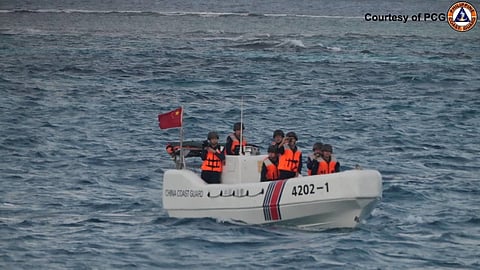
- NEWS
- the EDIT
- COMMENTARY
- BUSINESS
- LIFE
- SHOW
- ACTION
- GLOBAL GOALS
- SNAPS
- DYARYO TIRADA
- MORE

An official of the Philippine Coast Guard (PCG) slammed China’s desire to impose a “new order” to justify its illegal presence in the West Philippine Sea (WPS).
PCG spokesperson for WPS, Commodore Jay Tarriela, lambasted the China Coast Guard (CCG) for conducting unlawful maritime operations near the Philippines' coastline.
“Without needing to emphasize the key points of the 2016 Arbitral Award, which invalidated their nine-dash line claim, it’s evident that anyone with a sound mind, genuinely concerned about preserving peace and stability in the region, would acknowledge that their presence in the Philippines’ Exclusive Economic Zone is both barbaric and illegitimate,” Tarriela said in his X (formerly Twitter) post on Sunday.
He lamented that the Chinese vessel, in its radio communications with the PCG’s BRP Cabra, is blatantly asserting jurisdiction over waters that are part of the Philippines’ Exclusive Economic Zone (EEZ), despite being well beyond China’s claimed baseline.
“It is clear that the Chinese Communist Party is disregarding international law while arrogantly asserting jurisdiction over these waters, which are well beyond the People's Republic of China's baseline,” he said.
Tarriela also hit the CCG, whose vessels have been illegally operating off the Zambales coasts, for intimidating the PCG ship.
“Furthermore, their threats against the legitimate presence of the Philippines conducting maritime patrols — warning that if we do not leave, they will take necessary measures and we will bear the consequences — clearly indicate China’s desire to impose a new order that undermines the rules-based international system,” he said.
He pointed out that China’s incursions into Philippine waters were escalating tensions and compromising regional peace and stability.
“They appear intent on reverting to a system where might dictates what is deemed right, allowing powerful countries to impose their interests at the expense of others' rights and jurisdictions,” he added.
Meanwhile, Tarriela said the Philippines has been “more assertive” in its approach against Chinese aggressions in the WPS, including deepening its security alliance not only with the United States but with other countries like Australia and Japan as well as the European Union.
In an incident on Saturday, Tarriela condemned the CCG’s use of a long-range acoustic device (LRAD) against the PCG vessel.
“For the first time, CCG-3103 employed a Long Range Acoustic Device (LRAD) to harass the Philippine Coast Guard vessel, attempting to deter proximity,” he said.
“The LRAD has been described by crew members as producing high decibel levels that can be painful and damaging to hearing,” he added.
The CCG 3103 replaced CCG 3304 on Saturday afternoon as Beijing maintained its illegal patrol.
Tarriela said the CCG-5901, also known as the “Monster ship,” seems to be escorting the CCG 3103, which replaced CCG 3304 in their illegal incursion into Philippine waters.
The PCG’s BRP Cabra diligently pushed back to a position between 90 and 95 nautical miles from the shore.
“This achievement is a testament to the vigilance and bravery of the men and women aboard BRP Cabra, who have shadowed the CCG at close distances while conducting hourly radio challenges to assert that the Chinese presence violates the Philippine Maritime Zones Act, the United Nations Convention on the Law of the Sea (UNCLOS), and the 2016 Arbitral Award,” he said.
Tarriela emphasized that the PCG will strive to “avoid provocation and escalation” of tensions in the WPS.
